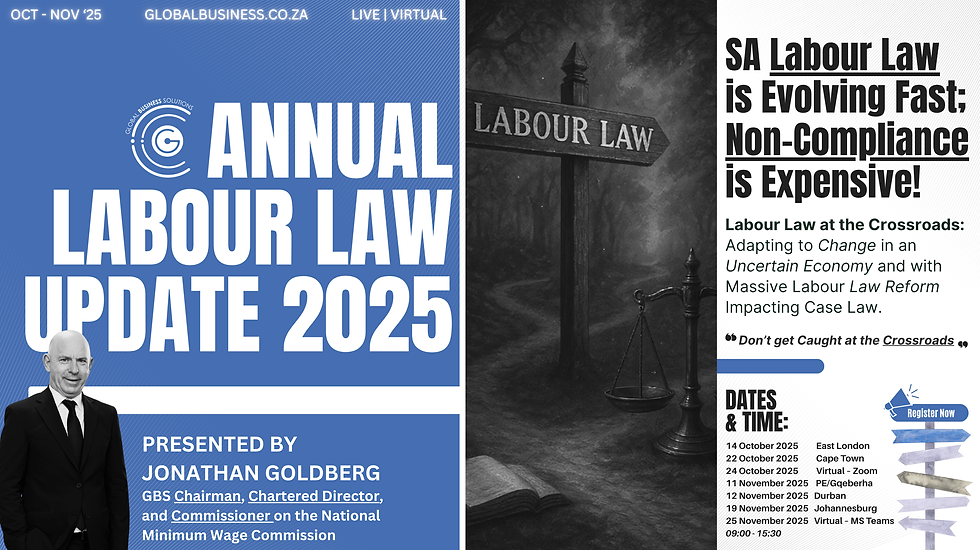The Cost of False Qualifications: New Legislative Measures to Combat Academic Fraud in the Workplace
- John Botha

- Aug 6, 2025
- 3 min read

Recent high-profile cases have highlighted the serious consequences of qualification fraud in South Africa's professional landscape. As employers, understanding these developments and the proposed legislative changes is crucial for protecting your organisation and ensuring compliance with emerging legal requirements.
Recent Cases Demonstrate Severe Consequences
Two prominent cases illustrate the personal and professional devastation that qualification fraud can cause:
The Corporate Executive Case
A former EOH director who held multiple senior positions including Chair of the social and ethics committee and Lead independent director, faced severe penalties after falsely claiming to hold a PhD in International Finance from London Business School. Despite never obtaining this qualification, she maintained this deception throughout her tenure from June 2019 until her resignation in July 2020. The consequences were substantial: a R500,000 fine, public censure, and a 10-year disqualification from holding positions at JSE-listed companies.
The Legal Professional Case
In another striking example, a NPA prosecutor who had applied for promotion to Regional Court level, was found to have misrepresented his academic credentials. He claimed to hold an LLB degree from Walter Sisulu University and presented fraudulent attendance reports. However, investigations revealed he had enrolled from 2010-2016 but never graduated or received the degree. The consequences included criminal charges for fraud, forgery, and uttering; a forced resignation; and court proceedings in the Mthatha Specialised Commercial Crimes Court.
Legislative Response: Proposed NQF Act Amendments
The government has recognised the urgent need to address qualification fraud through comprehensive legislative reform. The proposed amendments to the National Qualifications Framework (NQF) Act introduce several key requirements that will significantly impact employers:
Mandatory Verification Obligations Under the proposed changes, employers will be legally required to verify every qualification presented by prospective employees. This verification must be conducted through the national learners' records database or directly with the South African Qualifications Authority (SAQA). This represents a shift from voluntary best practice to legal obligation.
Reporting Requirements Employers who discover fraudulent, misrepresented, or invalid qualifications will be required to report these findings to SAQA. This creates a centralised system for tracking qualification fraud and prevents individuals from simply moving to new employers after being discovered.
Enhanced Transparency Measures SAQA will establish and maintain public registers of misrepresented or fraudulent qualifications. These registers will be accessible to both employers and the public, creating a transparent system that serves as both a verification tool and a deterrent to potential fraudsters.
Criminal Penalties The amendments introduce criminal offences and penalties, including fines and imprisonment, for individuals who misrepresent qualifications. Importantly, employers who fail to conduct required checks or knowingly appoint individuals with fraudulent qualifications will also face penalties.
Public Accountability SAQA will periodically publish the Register of Misrepresented Qualifications, ensuring public accountability and serving as a deterrent to both potential fraudsters and negligent employers.
Implications for Employers
These developments signal a fundamental shift in how qualification verification will be handled in South Africa. Employers should begin preparing for these changes by:
Reviewing current recruitment and verification processes
Establishing systems for systematic qualification checks
Training HR personnel on verification requirements
Developing policies for reporting discovered fraud
Considering the resource implications of mandatory verification
The cases referred to demonstrate that qualification fraud affects professionals at all levels and across all sectors. The proposed legislative changes reflect the government's commitment to maintaining professional integrity and protecting employers from the risks associated with hiring unqualified individuals.
As these amendments progress through the legislative process, we recommend that employers begin implementing robust verification processes now, both to protect their organizations and to prepare for the legal requirements that will soon be mandatory.
Join us at the Annual Labour Law Update. This year's theme is Labour Law at the Crossroads: Adapting to Change in an Uncertain Economy and with Massive Labour Law Reform Impacting Case Law. What you'll gain:
Master the Digital Transformation of Labour Law in 2025
200+ Labour Law Cases Unpacked by Jonathan Goldberg
Critical Updates on Upcoming Legislation & NEDLAC Amendments
Navigate Workplace Challenges from the Digital Era to Discrimination Laws

View our upcoming events: Upcoming Events, like EFFECTIVE ARBITRATION: Practical Tools for Labour Disputes, or Effective Strike Management.
*All workshops are offered as customised in-house training that can be presented virtually or on-site.
"Global Business Solutions (GBS)—Your Partner in Strategic HR Compliance"




Comments